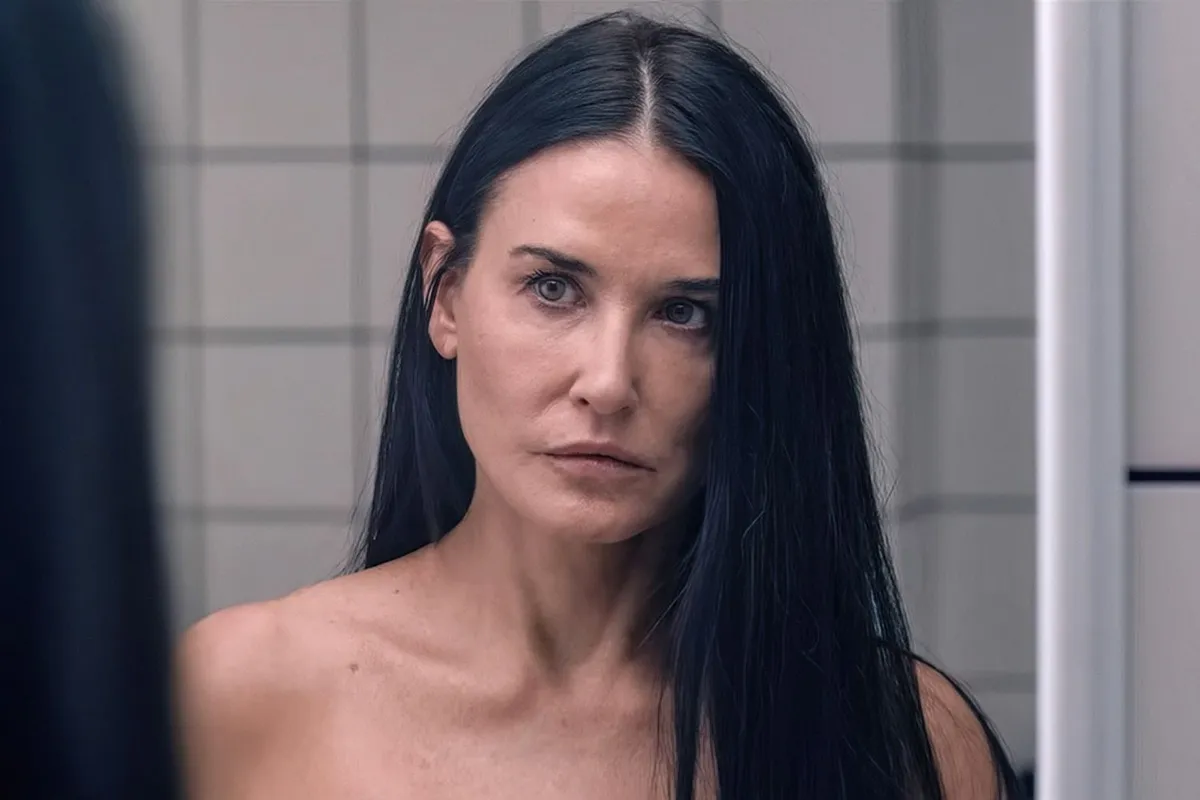The Substance: 'The Picture of Dorian Gray' for the TikTok Generation

Groupthink: mode of thinking in which individual members of small cohesive groups tend to accept a viewpoint or conclusion that represents a perceived group consensus, whether or not the group members believe it to be valid, correct, or optimal.1
That’s what best describes the critical reception to Coralie Fargeat’s The Substance. Either that or a collective prank played on me and a handful of other sane people.
I’ll get the positive (singular) out of the way: the physical effects are great. Creepy and wonderfully detailed. It has to be respected. On to the many negatives.
Fargeat’s film is one of the most vapid and insulting I’ve ever seen. It’s a maximalist nightmare that eschews all forms of subtlety for broad, faux-progressive satire.
What is the message of this film? The one it wants you to take away is “don’t chase eternal youth or you may regret it”. It wants to critique society’s attitudes toward beauty standards and the role they play in entertainment (and rightly so) by indulging in them.
Elisabeth’s predicament is placed squarely at her feet rather than at society, the Fargeat’s intended target. Her desire for youth and beauty is her downfall as shown when she fails to stop using The Substance the first time. Her vanity is presented as the problem which is she punished for throughout the film.
To bring it back to subtlety, one of the most basic lessons that gets taught in any screenwriting 101 class is “show don’t tell”. Fargeat must have skipped that class because Jesus fucking Christ this is insulting.
The conceit of the film is explained to death over the course of forty agonising minutes, as the rules of using ‘The Substance’ are literally written in bold letters on the screen and repeated by voice-over multiple times. This practice of egregious exposition reaches its zenith when Elisabeth meets the young doctor’s “matrix” at a cafe. Fargeat treats her audience as if they are morons, by using six different ways to tell us that this man and the young doctor are the same. Six. In less than thirty seconds.
Dennis Quaid’s TV executive character is called Harvey. That’s all I need to say, but there’s more. He’s presented as a representation of Hollywood’s views, that vast snarling monster, yet is portrayed as toothless and strangely flamboyant by Quaid. Is he a threatening menace or is he not?
I’m not one for “plot holes”, I can suspend my disbelief for almost anything2 but I was immediately asking what Elisabeth got out of this arrangement. Supposedly Sue and Elisabeth are one and the same but nothing indicates this. They have different memories, different goals and aren’t even conscious at the same time. It contributes further to a confused and muddy theme.
This is not the work of a seasoned director. Coralie Fargeat has directed two features as of now, the other being Revenge; a rape-revenge thriller which has received much critical praise. I’ve not seen it and prior to watching her second film I’d not heard much of Fargeat. A quick read of her Wikipedia page revealed a few interesting details. Regarding her filmmaking style:
Fargeat believes that films that fill themselves with homages and references can push the viewer away from being able to identify with the film. She describes this separation as "second-degree moments" and chooses to stay away from excessive references.3
Which I thought was funny as The Substance contains a fair amount of references to The Shining (a horrendous horror film cliche) and The Elephant Man. I also found it amusing when reading that she’s “a fan of using imagery and symbols to express something simple in a powerful way.” Can’t wait for her to start doing that.
I place this firmly in a category of modern film, along with the likes of Saltburn and Midsommar, that believes a work is merely a collection of shocking images. Story, for these films, is merely the vehicle in which they get screen-shottable, social media friendly aesthetics to their audiences. Is this the future of film? A series of disjointed shots lacking in meaning and cinematic impact in service of neoliberal, Twitter discourse fables?
No. Of course not. Cinema is too broad a church for it to be swallowed whole by this loathsome style. But it is a subgenre which has continued to grow since this new generation of Millenial filmmakers have entered the fray. I have plenty of hope for the future of film. I sincerely hope however that with her next film, everyone will see the emperor’s lack of clothes and Fargeat will be seen as the hack she is.